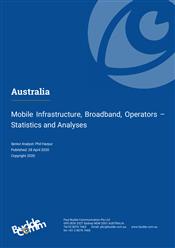Australia - Mobile Infrastructure, Broadband, Operators - Statistics and Analyses

Last updated: 28 Apr 2020 Update History
Report Status: Archived
Report Pages: 149
Analyst: Sebastien De Rosbo
Synopsis
The Australian mobile market is dominated by the three major mobile network operators Telstra, Optus, and Vodafone (VHA). These have been able to offer LTE services on a wholesale basis thus encouraging growth in the LTE sector.
There is also a significant number of Mobile Virtual Network Operators (MVNO) in Australia: These companies purchase wholesale mobile services from the MNOs, provide services under their own brand and typically provide their own billing and customer care. Key MVNOs in Australia include Amaysim, Kogan Mobile, Aldi Mobile, Ovo Mobile, Boost Mobile, Lebara Mobile and Virgin Mobile.
Australia’s mobile network operators continued to work towards the launch of 5G, laying foundations for the next-generation network and continued to develop and enhance their existing 4G networks on the upgrade pathway to 5G.
By 2019 all three MNOs now provide comprehensive population coverage with their LTE networks and were well on the way to launching 5G services.
In common with most mature markets, in Australia there are significantly more subscribers to mobile services than there are people. Growth is being driven by population increases as well as a rise in the number of people using two or mobile subscriptions – commonly one is for personal use and another for business use.
Very slow growth is predicted over the next five years to 2024 with penetration rates predicted to rise only slightly above projected population increase.
Revenue for mobile operators in recent years has been characterised by the continuing take up of services based on LTE technology, and to the rising proportion of mobile data to overall revenue.
All three Australian mobile operators are now investing billions of dollars in their networks annually, with a view to securing new customers and retaining existing ones. Increasingly, consumers are looking to mobile communications for their broadband needs.
BuddeComm notes that the outbreak of the Coronavirus in 2020 is having a significant impact on production and supply chains globally. During the coming year the telecoms sector to various degrees is likely to experience a downturn in mobile device production, while it may also be difficult for network operators to manage workflows when maintaining and upgrading existing infrastructure. Overall progress towards 5G may be postponed or slowed down in some countries.
On the consumer side, spending on telecoms services and devices is under pressure from the financial effect of large-scale job losses and the consequent restriction on disposable incomes. However, the crucial nature of telecom services, both for general communication as well as a tool for home-working, will offset such pressures. In many markets the net effect should be a steady though reduced increased in subscriber growth.
Although it is challenging to predict and interpret the long-term impacts of the crisis as it develops, these have been acknowledged in the industry forecasts contained in this report.
The report also covers the responses of the telecom operators as well as government agencies and regulators as they react to the crisis to ensure that citizens can continue to make optimum use of telecom services. This can be reflected in subsidy schemes and the promotion of tele-health and tele-education, among other solutions.
Key developments:
- Australia's mobile network operators continue to work towards the launch of 5G.
- Australia is predicted to be one of the top four of markets that will drive the growth of 5G in Asia.
- 5G connections are predicted to account for around 50-60% of total connections by 2025.
- Very slow mobile subscriber growth is predicted over the next five years to 2024.
- 4.5G and 5G are the new frontiers linked to wearable device communications and other IoT and M2M activities.
- Assessment of the global impact of COVID-19 on the telecoms sector.
Companies mentioned in this report:
VHA, Vodafone, 3, Optus, Huawei, Telstra, Vividwireless, Ericsson, EnergyAustralia, SingTel, Unwired, Kogan Mobile, Apple, Nokia, Google, Ericsson, Samsung, Vodafone, 3, VHA, Optus, Telstra.
Related Reports
- Australia - Telecoms, Mobile and Broadband - Statistics and Analyses
- Australia - Data Centre Market
- South Pacific Islands - Telecoms, Mobile and Broadband - Statistics and Analyses
- Samoa - Telecoms, Mobile and Broadband - Statistics and Analyses
- Papua New Guinea - Telecoms, Mobile and Broadband - Statistics and Analyses
- New Zealand - Telecoms, Mobile and Broadband - Statistics and Analyses
- French Polynesia - Telecoms, Mobile and Broadband - Statistics and Analyses
- New Caledonia - Telecoms, Mobile and Broadband - Statistics and Analyses
- Vanuatu - Telecoms, Mobile and Broadband - Statistics and Analyses
Share this Report
TMT Intelligence
A platform to scale your intelligence tasks
Monitor critical insights with our AI-powered Market Intelligence Platform gathering and analyzing intelligence in real time. With AI trained to spot emerging trends and detect new strategic opportunities, our clients use TMT Intelligence to accelerate their growth.
If you want to know more about it, please see:
Research Methodology
BuddeComm's strategic business reports contain a combination of both primary and secondary research statistics, analyses written by our senior analysts supported by a network of experts, industry contacts and researchers from around the world as well as our own scenario forecasts.
For more details, please see:
More than 4,000 customers from 140 countries utilise BuddeComm Research
Are you interested in BuddeComm's Custom Research Service?
Hot Topics
News & Views
Have the latest telecommunications industry news delivered to your inbox by subscribing to BuddeComm's weekly newsletter.